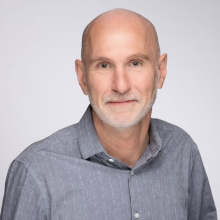Marc D. McKee
Professor, Department of Anatomy and Cell Biology
Professor, Faculty of Dental Medicine and Oral Health Sciences

PhD - McGill University, Cell Biology
Postdoctoral Fellowship - Department of Orthopedic Surgery, Harvard University & The Children's Hospital in Boston
Marc McKee is a full professor at McGill University in Montreal with a joint appointment in the Faculty of Dental Medicine and Oral Health Sciences, and in the Faculty of Medicine and Health Sciences (Department of Anatomy and Cell Biology). He holds the Canada Research Chair in Biomineralization. He received his B.Sc., M.Sc. and Ph.D. degrees from McGill University in cell biology, and completed a postdoctoral fellowship in the Department of Orthopedic Surgery at Harvard University and The Children's Hospital in Boston. He then held academic appointments at the Forsyth Institute in Boston (1989), and at the University of Montreal (1990), after which he moved to McGill University in 1998.
McKee has received the following distinctions:
- 2019 Adele L. Boskey Award, Esteemed Award from the American Society of Bone and Mineral Research
- 2018 CP Leblond Award, Quebec provincial health research funding agency (FRQ-S) Network for Oral and Bone Health Research
- 2018 Canada Research Chair in Biomineralization (Tier 1), Government of Canada CRC Chair Program
- 2008 Faculty of Medicine Honour List for Educational Excellence, McGill University
- 2006 James McGill Professor, McGill University Internal Chair Program
- 2005 Faculty of Dentistry Howard S. Katz Award for Excellence in Teaching, McGill University
- 2003 Basic Research in Biological Mineralization Award, Distinguished Scientist Award from the International Association for Dental Research
- 2001 William Dawson Scholar, McGill University Internal Chair Program
- 1996 Young Investigator Award, Distinguished Scientist Award from the International Association for Dental Research
- 1996 Quebec Science (popular magazine) "Top-Ten" Discoveries of the Year, Role of osteopontin in mineralized tissues
- 1994 Quebec Science (popular magazine) "Top-Ten" Discoveries of the Year, Bioactive coating for titanium implants
Research in my laboratory is primarily focused on mineralization (calcification) in extracellular matrices of bones and teeth, in mineralization pathologies, and in other biomineralizing systems such as inner-ear otoconia and eggshells. In particular, we are investigating the role of mineral-binding proteins, peptides, amino acids and other small molecules in crystal growth during normal hard-tissue mineralization, and in rare hypomineralization (osteomalacia) diseases of bones and teeth such as X-linked hypophosphatemia and hypophosphatasia. We also investigate how enzymes modify these factors to influence their mineralization-regulating activities. Our work also includes investigating pathologic circumstances and the actions of regulatory molecules where unwanted and debilitating mineral is deposited in soft tissues such as in the kidney (urolithiasis, kidney stones) and in blood vessels (vascular calcification). The proteins/enzymes that we are currently focusing on are osteopontin and PHEX. We also examine extracellular matrix organization and composition at cell- and matrix-matrix interfaces, and we examine the nanostructure of mineralized tissues. To study these processes, a variety of morphological, biochemical, immunochemical, cell biological and molecular techniques are used which include among others: electron microscopy and tomography, focused-ion beam milling, atomic force microscopy, confocal microscopy, immunocytochemistry, in vivo experimentation using normal and transgenic mice, in vitro cell culture and crystal growth systems, and standard biochemical and chemical assays.
